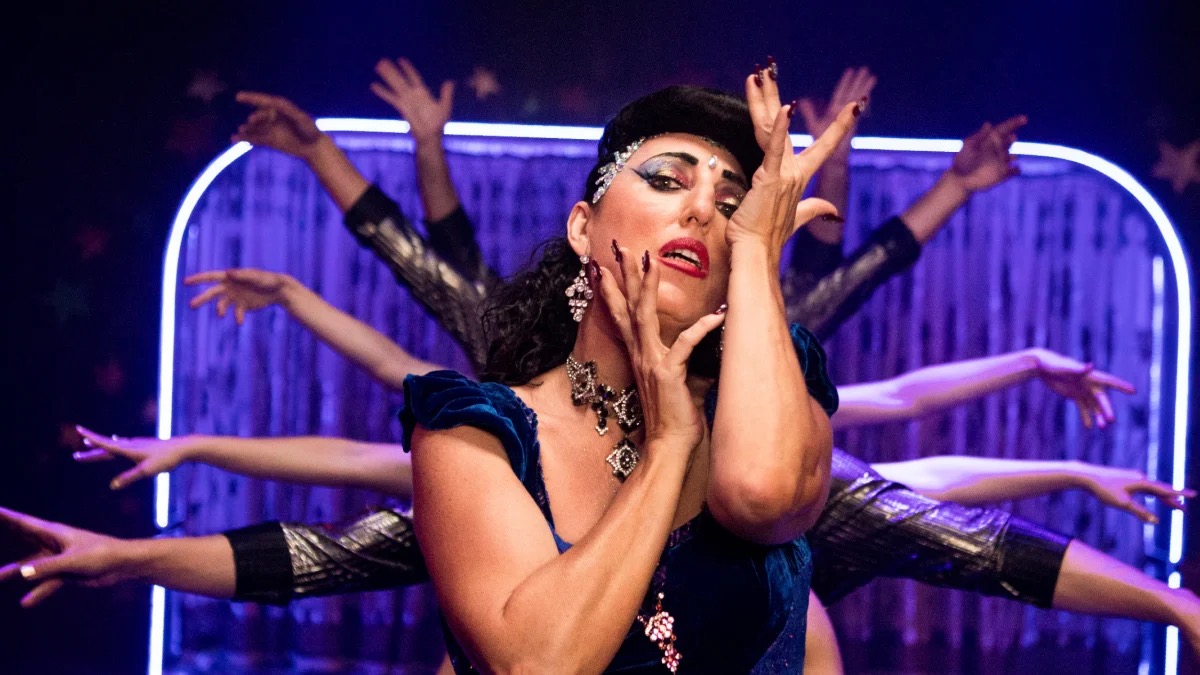Content warning: This article discusses racism and racial violence.
Desolate, arid, and unforgiving—with lifeless opening shots of the Chihuahuan desert, Carmen (2023) warns viewers that much like its setting, its story is rough terrain. Loosely based on a nineteenth century opera of the same name, director Benjamin Millipied’s take is nothing like its outdated source material. While grappling with the harsh reality undocumented migrants face crossing the U.S.-Mexican border, the film also draws on the Latin American literary tradition of magical realism to create oases of escape. A story of unlikely companionship, Carmen urges its audience to question what family means when blood runs out.
Melissa Barrera poignantly portrays the titular Carmen, a woman forced to flee across the border to America without documentation after her mother Zilah (Marina Tamayo) is inexplicably murdered. Before we’re introduced to any of the characters, a woman’s voice—later revealed to be Zilah’s—narrates the initial desert shots in Spanish, warning of a figurative man who “yearns for the tears of our eyes. The milk from our breasts. The blood of our womanhood.” This man isn’t a potential lover, but the personification of a patriarchy that extracts love and energy from women before leaving them out to dry. Spoken by a character whose voice we only hear in narration, this introduction propels the story forward: Centered around female support networks that hold strong even when some of its members have passed, Carmen speaks to the resilience and power of these connections. As long as marginalized communities lose members to violence at disproportionate rates, women in those communities will continue to find solace in one another.
The same night Carmen desperately crosses the border, U.S. military veteran Aidan’s (Paul Mescal) sister demands that he pick up a shift patrolling it to get them some much-needed cash. Suffering from PTSD and acutely aware of military-grade weapon capabilities, Aidan vehemently protests his sister’s urgings, but ultimately succumbs. When first-timer Aidan arrives at the patrol facility, the leader thanks him for his military service and assures Aidan that he’ll get satisfaction from being able to “defend” his country from his home turf. Aidan remains silent as the agents gear up; one of them suggests that they should learn Spanish if they’re “hunting Mexicans,” to which another replies, “Why, you speak deer?” The latter ends up partnered with Aidan, and when they find migrants—including Carmen—hiding out, the agent shoots and kills those who can’t run away in time. He chases Carmen down and holds her at gunpoint—but in a split-second decision, Aidan shoots the agent in the head, saving Carmen’s life. This spurs Aidan and Carmen’s involuntary Bonnie-and-Clyde life on the run, made fugitives by the unjust institutions that police the border.
The overt racism and xenophobia that drive immigration enforcement crucially foreground the story, but as the film progresses, it prefers to show rather than tell—instead of biting off more than it can chew in terms of political messaging, it demonstrates that the personal is inherently political through Carmen and Aidan’s journey. The film almost veers into problematic territory by seeming to suggest that white Americans should be concerned about oppressive institutions like border patrol not because they are morally abhorrent, but because they also have the potential to corrupt the executors of that oppression. But as Aidan’s staid, largely passive presence throughout the film clarifies, he is not a symbol of white saviorism or sullied American altruism; instead, he’s a wayward soul who was drawn to Carmen by some mystical force.
This is where the magical realism comes in, as Aidan and Carmen have a spiritual connection even before they meet; when Carmen burns down her family home in Mexico, shots of the flames spreading cut to a visual of smaller fires appearing outside Aidan’s house, which he tries in vain to tamp down. Close-up shots of the flames reflecting in his eyes convey the pair’s cliché but compelling “twin flame” duality. The intensity of their connection is undeniable in their dance scenes, tender moments of true intimacy that showcase Millipied’s extensive dance background and draw most obviously upon magical realism.
Millipied occasionally falls flat in his full-length directorial debut, suffering from uncomfortably long silences in sparse dialogue that is often clichéd or unsubtly forces a deep conversation between Aidan and Carmen. Though the leads may seem awkward with one another at times, instances of magical realism, which briefly take them out of the mundane, clearly express their connection. To those unfamiliar with the genre, it may seem random when a scene of Carmen and Aidan running from the police cuts to a sequence of the two twirling in the desert at dawn, but that’s what magical realism is: moments of fantasy that embellish a story grounded in reality in order to expose a deeper truth. Pivotal moments are punctuated by dreamlike dance sequences that take the viewer out of the terror of Carmen’s treacherous pilgrimage and instead relish in her own strength and the comfort of Aidan’s companionship. It sounds corny to say that their chemistry is most obvious when they dance together, but if you can buy into it (and get past Mescal’s evident lack of dance training), you can’t deny that it’s true.
Beyond the scenes of escape from reality, score composer Nicholas Britell and cinematographer Jörg Widmer imbue the entire film with a sense of magic. Best known for the award-winning original score of Succession (2018), Britell brings his genius to Carmen with an unrelenting composition that, coupled with dance, sets the film’s disorienting pace: slow, intimate moments make your heart race, while action sequences feel almost calming. Britell places the emphasis of the story on Carmen and Aidan’s emotional journey toward one another instead of on the physical “running from the law” aspect that could have easily overshadowed it. Filled with swelling strings and hauntingly layered vocals, the score completely immerses viewers in the mystical world of Carmen. Widmer’s visuals complement Britell’s work, using aesthetic beauty in unexpected places to lure the viewer into the magic. Shots of Aidan running through windmill-like spirals of electrical sparks or standing dangerously close to neon string lights dangling above puddles create simultaneous anxiety and awe that, when coupled with the score, make your adrenaline run high. This is especially true of the dance scenes that harmoniously marry visuals, sound, and choreography, communicating a profound sense of magic that transcends verbal expression.
Dance connects Carmen to the people she loves, which comes to include Aidan, but began with her mother. The first character shot of the film is a close-up of Zilah’s feet ferociously dancing a flamenco on a wooden pallet in the desert. Millipied brilliantly establishes dance as the heart pumping blood throughout the film as Zilah’s dance quickens in pace while her assassins approach; when they finally fire the fatal shot, the score cuts out, and absolute silence envelops our first introduction to Carmen, who stops running when her mother stops dancing.
After she’s murdered, Zilah’s narration instructs Carmen to go find a woman named Masilda (Rossy de Palma) in the States, giving her daughter permission to seek family elsewhere: “You carry my blood, my milk, my tears. Take them to my Masilda. Both of you, share them.” When Carmen finally finds Masilda, her mother’s dearest friend instantly recognizes her as Zilah’s daughter; out of love and loyalty for her late friend, she takes Carmen in without hesitation. As Masilda and Carmen dance together, Zilah’s reflection watches from the mirror and smiles peacefully, her spirit kept alive by the two women’s determination to not let it die.
Although Carmen finds romance along the way, the re-centering of her mother cements the film’s foundation in female solidarity. By nurturing her love for dance with Masilda’s support, Carmen comes to learn that no boundary—between countries, nor between the living and the dead—can break the maternal bond.





